Status Kepemilikan Atas Satuan Rumah Susun Oleh Warga Negara Asing di Indonesia
Keywords:
Belonging, flat, expatriatAbstract
For answer demand the house as a place to stay that is growing but diminishing availability of land and limited then trigger the development of flats grew rapidly. Construction of flats not only can save the land use is increasingly crowded, but also one of the alternatives to the arrangement of land use land or often known as spatial planning. Spatial planning is a system consisting of three (3) phases, namely spatial planning, space utilization, and control the utilization of space. There are two (2) elements in the spatial arrangement of the structure and pattern of spaces. The structure of the room is the arrangement of settlements and the network of infrastructure and tools that support the social economy in society that its hierarchical structure. Then, the spatial pattern is the distribution of allotment of space in an area that includes the spatial allocation for protection functions and the allocation of space to function cultivation. Spatial planning shall be basically for the welfare and prosperity of the people. Good spatial planning, neat and orderly as in developed countries can encourage well-being and prosperity of its people.
Keywords: Belonging, flat, expatriat







